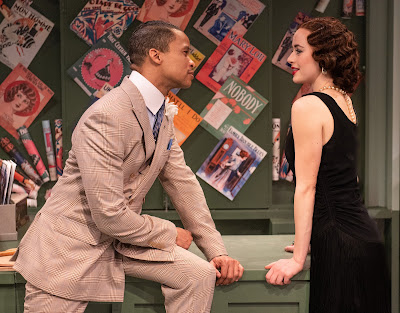By Harry Forbes
Andrew Lloyd Webber has already had a crack at another iconic children's tale, “The Wizard of Oz,” though it was only a partial score, as he was supplementing the familiar Harold Arlen / Yip Harberg tunes from the MGM film.
His take on Cinderella is all his. But it might as well be the work of two composers: the Lloyd Webber of lush romantic melodies and the Lloyd Webber of pastiche pop and rock. The blend of both has often paid off several times, most lucratively with “The Phantom of the Opera.” But here it's a frustrating mix.
The lush ballroom music, a couple of the romantic ballads especially the Prince's "Only You, Lonely You" and Cinderella's "Far Too Late," as well as felicitous bits and pieces throughout are, taken on their own terms, really quite nice and make one wish this were a full-out romantic telling of the Perrault/Grimm story.
As it is, it's a goofy feminist riff on the tale, courtesy of Emerald Fennell, screenwriter of the clever “Promising Young Woman.” (Alexis Scheer is credited with additional script material.) Douglas Carter Beane’s script revision of the Rodgers & Hammerstein “Cinderella” last on Broadway brought the story more up-to-date but arguably in a much more tasteful, and still amusing, way. They’ve set this one in a town called Belleville, where beauty is the superficially guiding principle. The Godmother (Christina Acosta Robinson) is part beautician/part plastic surgeon.
Fennell’s Cinderella is a grumpy goth gal who, in less enlightened times might have been termed a tomboy. And Prince Sebastian is actually the awkward and shy younger brother of the more famous Prince Charming who has been missing in action and presumed dead. Sebastian and Cinderella have been sparring buddies since childhood but it takes them two acts to realize that their easygoing friendship is, in fact, love.
Cinderella's stepmother is as ambitious as tradition makes her but has less control of Cinderella who, in this girl power telling, has plenty of agency. She's played with scene-stealing panache by Carolee Carmelo who gives her every line a delicious comic spin, finding nuances that, at least on the basis of the London cast LP, were missed by her U.K. counterpart.
Carmelo has a worthy adversary in Grace McLean as the Queen who harbors a surprisingly kinky admiration for her missing son. And their bitchy duet "I Know You" is the show’s witty highlight. It also happens to be veteran lyricist David Zippel’s best work here. Otherwise, the reliable Zippel, who previously teamed with Lloyd Webber for “The Woman in White,” is less than inspired, pandering, like the show in general, to a puerile audience.
Fennell’s script is filled with inconsistencies and head scratching moments. Again, on the basis of the London album, it would seem there have been some dialogue changes. There is, in addition, some new music and a reordering of some numbers.
Though admittedly a subjective opinion, the character of Cinderella, as written, is simply not appealing enough to keep us rooting for her, though Linedy Genao plays her well enough and socks over the power ballads to maximum effect. These include the rather monotonous title song, which includes a brief nod to “In My Own Little Corner” from Richard Rodgers’ “Cinderella” score, and “I Know I Have a Heart (Because You Broke It),” the thrust of which would seem to harken back to the Tin Man’s sentiments in “The Wizard of Oz.”
Jordan Dobson is very appealing as hapless Sebastian and his “Only You, Lonely You” ballad is arguably the best of the bunch. Curiously, virtually all of these pieces are soliloquies for either Cinderella or Sebastian.
Sami Gayle and Morgan Higgins are amusing as Cinderella's vain ambitious sisters in the usual manner. And when -- small spoiler -- Prince Charming eventually shows up, he's played with testosterone-fueled bravado by Cameron Loyal. (All the men in the town are ripped hunks.)
Laurence Connor directs the material at hand capably, with choreography by JoAnn M. Hunter. (The ball is nicely handled.) Gareth Owen’s sound design is pitched at standard Broadway decibels, which is to say, loud.
Gabriela Tylesova’s sets and costumes are certainly eye filling and fun on their own terms
If Lloyd Webber ever chooses to make a symphonic suite of this score, as he's done with so many of his previous shows, there would actually be a decent amount of listenable material with which to work. But I do wish that rather than turning out yet another show geared at the Gen Z crowd so soon after “The School of Rock,” he had opted for a more mature approach to the story, as his latter-day shows like “The Woman in White, “Stephen Ward” and “Love Never Dies” at least attempted to do.
(Imperial Theatre, 249 West 45th Street; badcinderellabroadway.com)
Photo by Matthew Murphy and Evan Zimmerman: (I.-r.) Linedy Genao and Jordan Dobson





